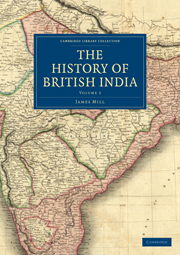Summary
It is now time to inquire into the proceedings to which the affairs of India had given birth in England since the last great legislative interference. From the year 1767 till the year 1773, the East India Company was bound to pay to the public yearly the sum of 400,000l., “in respect of the territorial acquisitions and revenues lately obtained in the East Indies.” But in the year 1773, the financial embarrassments of the Company became so great, that they were obliged to solicit, and received, a loan from the public of 1,400,000l. At that time it was represented, “That, in the then circumstances of the East India Company, it would not be in their power to provide for the repayment of such loan, and for the establishing their affairs upon a more secure foundation for the time to come, unless the public should agree to forego, for the present, all participation in the profits arising from the territorial acquisitions and revenues lately obtained in the East Indies.” It was, accordingly, at that time enacted, that it should not be lawful to make a dividend of more than six per cent. per annum on the Company's capital stock, till that loan was repaid; and that the whole of their surplus profits should be applied to its liquidation: that after the loan of 1,400,000l. should be repaid, it should not be lawful to make a dividend of more than seven per cent. per annum, upon the capital stock, until by the application of the whole of their surplus profits, their bond debt should be reduced to the sum of 1,500,000l.
- Type
- Chapter
- Information
- The History of British India , pp. 685 - 720Publisher: Cambridge University PressPrint publication year: 2010First published in: 1817



